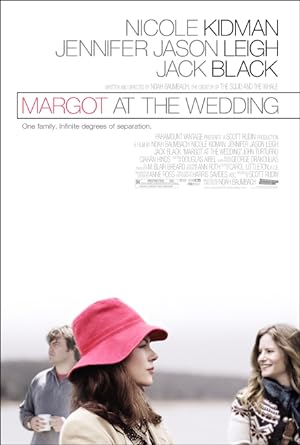Margot at the Wedding is about a writer, played by Nicole Kidman, and her son going to the writer’s childhood home for her sister’s wedding. Like in real life, the audience is not given background information, but witnesses the characters resume their familial conflicts and roles. Unlike The Squid and The Whale, I could not imagine a world where Margot’s behavior would be tolerated long enough to even have any relationships where people would want her in their lives for longer than a day. I suppose that she must be a great writer.
Noah Baumbach once again successfully captures dysfunctional families at the climax of emotional crossroads, but unlike The Squid and The Whale, Margot at the Wedding feels more like character tropes than real people, and there is no hope that the sibling competition will ever end. Margot is the uptight, neurotic intellectual and her sister, Pauline, played by Jennifer Jason Leigh is the chill, effortlessly sensual, earth mother; yet, I can’t even say that those tropes fit if you really look at the story. The most organic and real scenes occur between Leigh and Jack Black. You can see how they work together when no one is judging.
After I was finished watching Margot at the Wedding, I had questions that I wonder were ever answered in the movie, but I missed. Who were the gay couple at the first dinner, and how do they know Margot and still speak to her after the way that she talks about their child? What does Pauline do for a living to afford the taxes on their childhood property since her fiancé is probably not contributing to the house? (I did find out the answer to that one after I did some digging.) Why did Pauline divorce her first husband? I considered watching Margot at the Wedding again, but did not want to put myself through the mental torture of watching the characters eviscerate each other.
Maybe The Squid and The Whale works better than Margot at the Wedding because Noah Baumbach is as unflinchingly critical and simultaneously sympathetic with his character proxy as the other characters whereas Baumbach depicts the teenage boy as more of a victim. Perhaps Margot at the Wedding is as close as Baumbach will get to horror of the backwoods hillbilly variety-thnk Deliverance and The Texas Chainsaw Massacre, but the real horror is the psychological wounds inflicted by the family on each other in their attempts to obtain outward success.
Stay In The Know
Join my mailing list to get updates about recent reviews, upcoming speaking engagements, and film news.





